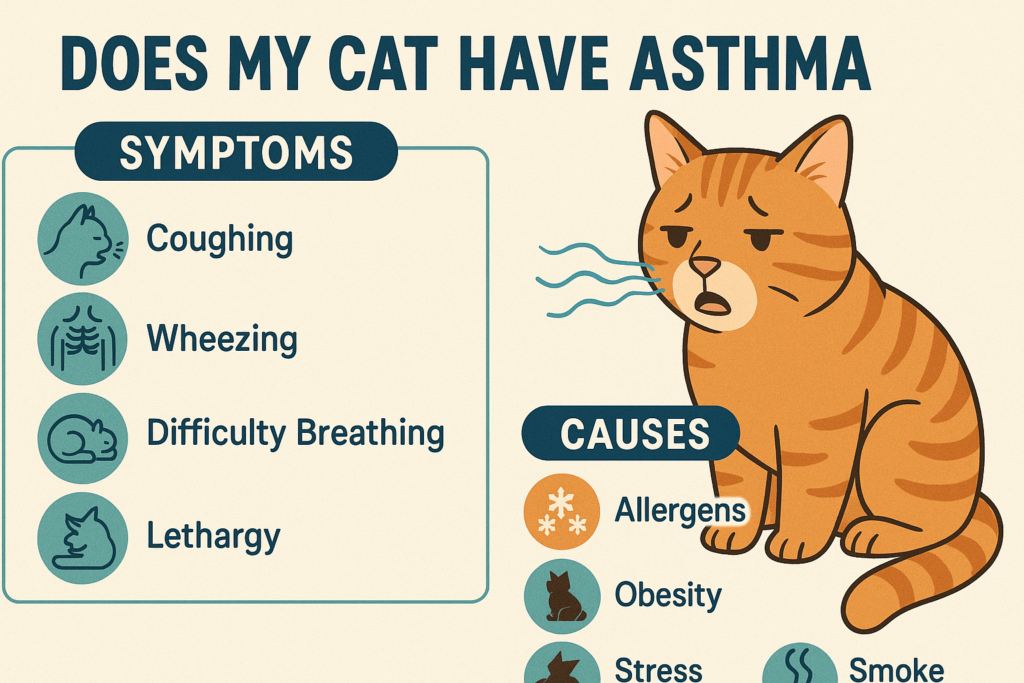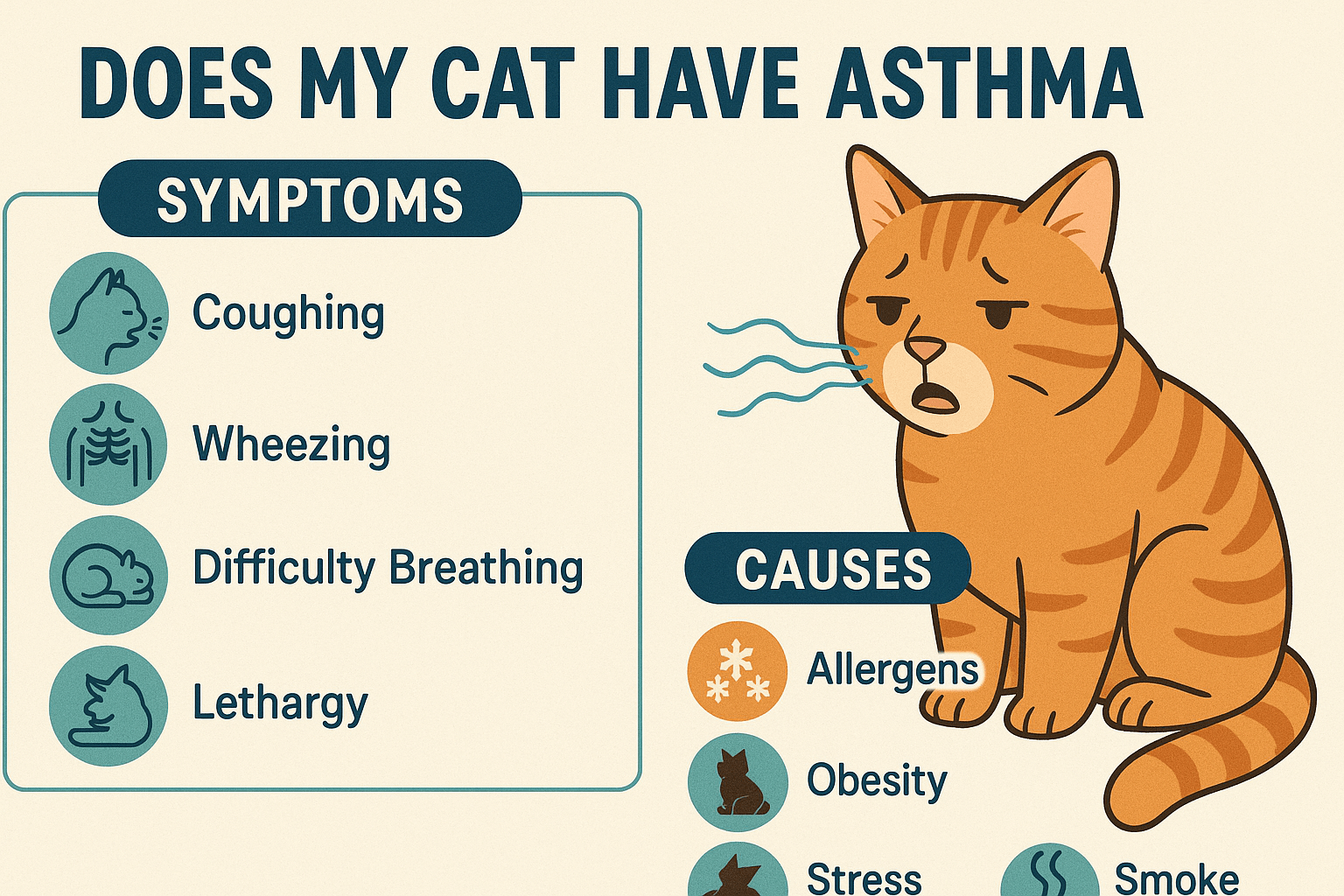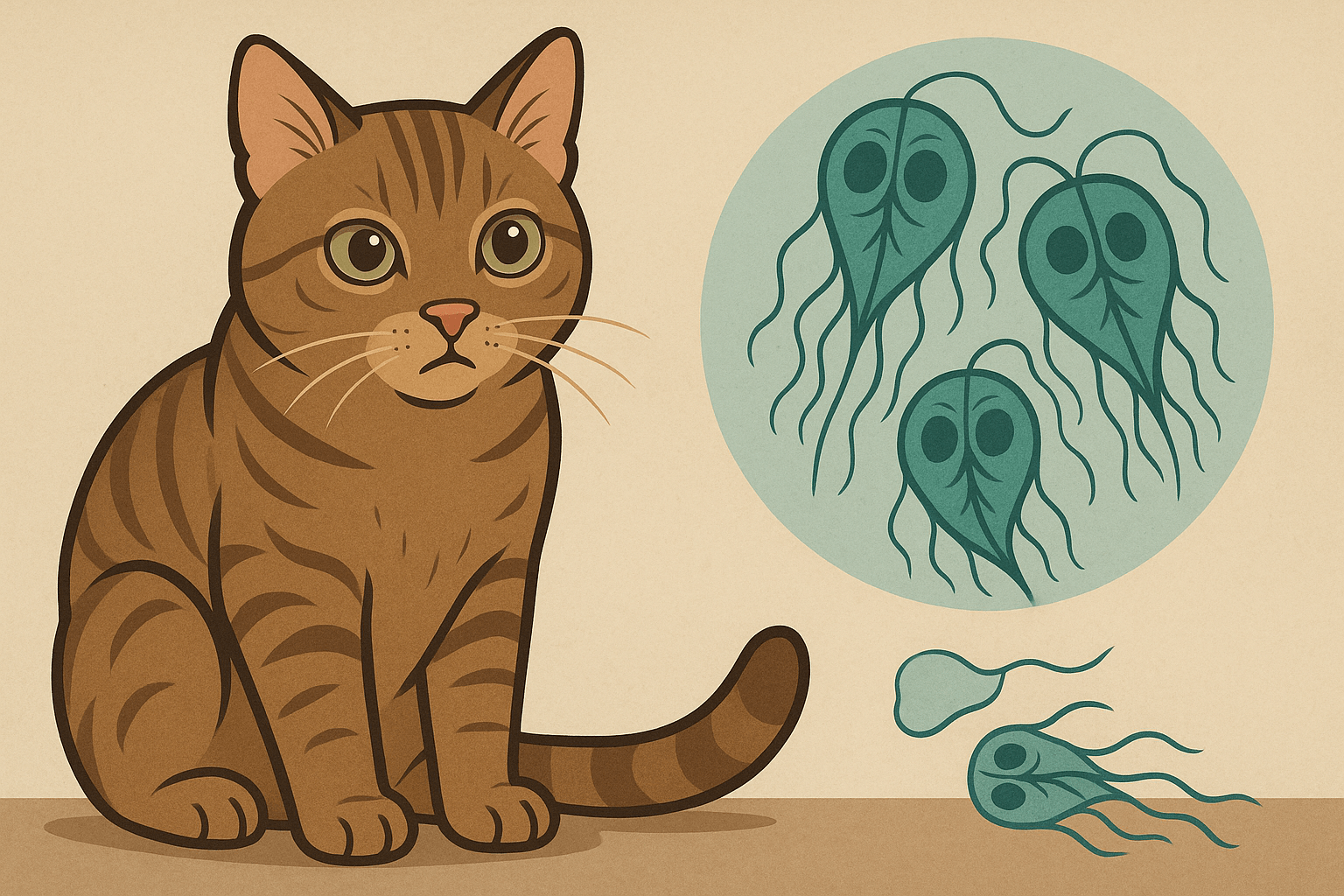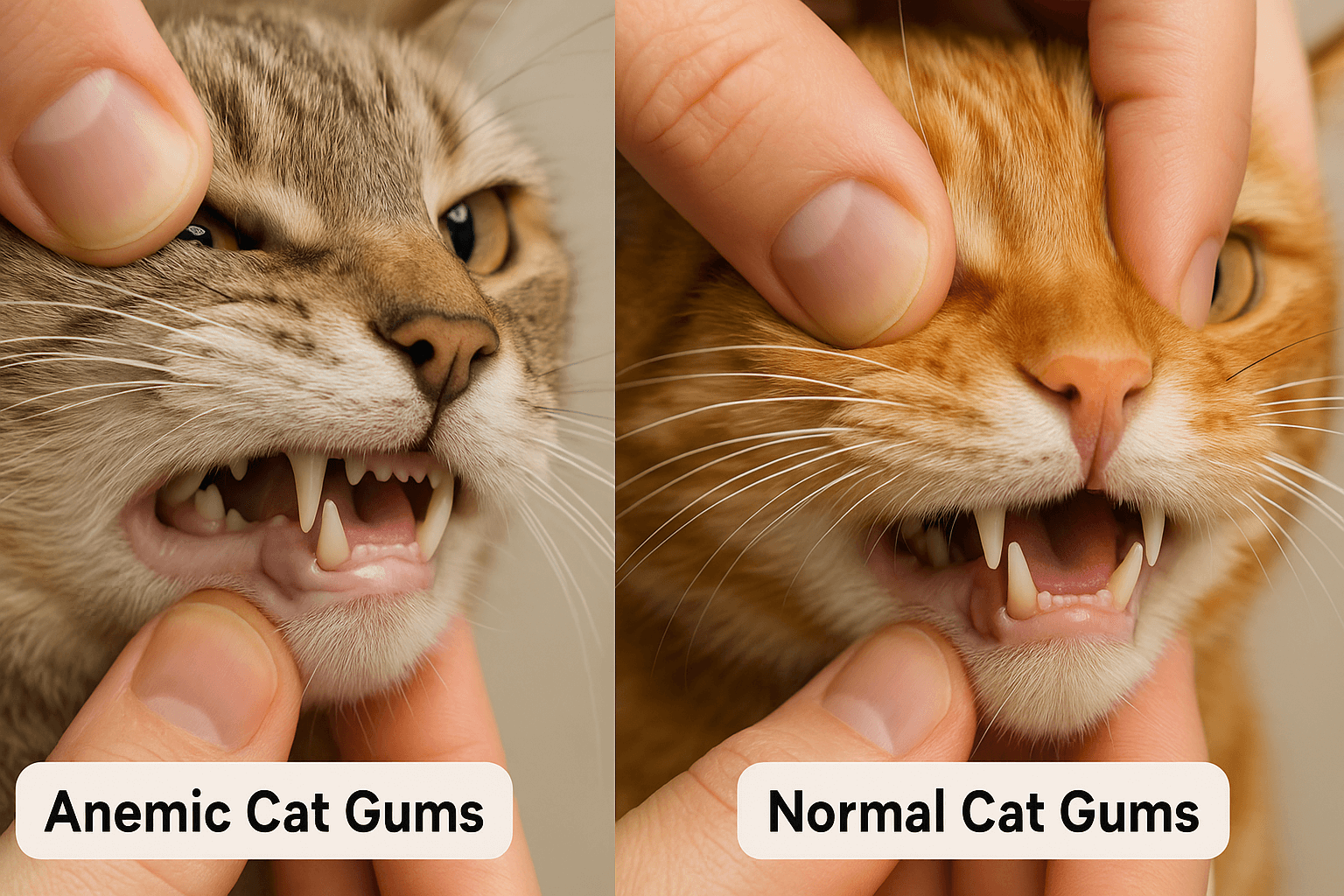Does My Cat Have Asthma?
If you’ve noticed your cat wheezing, coughing, or struggling to breathe, you might be wondering if they could have asthma. Feline asthma is a chronic respiratory condition that affects cats of all ages and breeds, though it’s often underdiagnosed or mistaken for other health issues. Understanding the signs, causes, and treatment options can help you determine whether your furry friend is experiencing this condition—and what steps to take next. In this guide, we’ll explore everything you need to know about feline asthma, from recognizing symptoms to managing long-term care.
Expert Insight on Feline Asthma
“Cat asthma is a recurring respiratory (breathing) condition that is characterized by inflammation (swelling) in the lungs and narrowing of the airways. Asthma is caused by contact with an allergen such as dust or pollen your cat inhaled while breathing. Asthma can be made worse by stress. Cats affected by asthma may show signs of coughing, difficulty breathing, and wheezing.”
Signs Your Cat May Have Asthma
Identifying asthma in cats can be challenging, as symptoms often mimic other respiratory conditions. However, certain behaviors and physical signs can point to this chronic ailment. Here are some key indicators to watch for:
Coughing or Gagging:
Cats with asthma may produce a hacking sound similar to a hairball retch but without expelling anything.Wheezing or Labored Breathing:
Audible wheezing or rapid, shallow breaths can signal difficulty getting enough air into their lungs.Lethargy and Fatigue:
A cat with asthma may seem unusually tired or reluctant to engage in activities they once enjoyed.Open-Mouth Breathing:
Breathing with an open mouth, especially during rest, is a red flag that requires immediate attention.Blue Gums or Tongue:
Bluish discoloration around the gums or tongue indicates oxygen deprivation and is a medical emergency.
If you notice any of these signs, it’s important to consult your veterinarian promptly to rule out or confirm asthma as the cause.

Potential Causes and Triggers of Feline Asthma
While the exact cause of feline asthma isn’t fully understood, several factors are believed to contribute to its development. Identifying potential triggers can help manage the condition more effectively.
Environmental Allergens:
Dust, pollen, mold spores, and cigarette smoke are common irritants that can inflame a cat’s airways.Household Chemicals:
Cleaning products, scented candles, and air fresheners may exacerbate respiratory issues in sensitive cats.Obesity:
Overweight cats are at higher risk for developing asthma due to added strain on their respiratory systems.Genetic Predisposition:
Some breeds, like Siamese cats, appear to have a genetic tendency toward asthma and related conditions.Stress and Anxiety:
Emotional stress can weaken a cat’s immune system, making them more susceptible to respiratory problems.
Understanding these triggers allows you to create a safer environment for your cat and minimize exposure to harmful substances.
Check this guide 👉Cat Asthma Attack at Night: Best 7 Health Tips!
Check this guide 👉Cat Asthma Life Expectancy: Best 7 Expert Tips!
Check this guide 👉Why Does My Cat Breathe Loud? Best 7 Health Tips!
Symptoms of Feline Asthma | Steps to Manage the Condition |
|---|---|
Coughing or gagging | Use air purifiers to reduce allergens |
Wheezing or labored breathing | Avoid smoking or using strong chemicals |
Lethargy and fatigue | Maintain a healthy weight through diet |
Open-mouth breathing during rest | Provide stress-free spaces for relaxation |
Bluish gums or tongue (emergency) | Schedule regular vet check-ups |
How Feline Asthma Is Diagnosed
Diagnosing asthma in cats involves ruling out other possible conditions and confirming the presence of respiratory inflammation. Veterinarians use a combination of tests and observations to reach a diagnosis.
Physical Examination:
Your vet will listen to your cat’s lungs and heart to detect abnormal sounds like wheezing or crackling.Chest X-Rays:
Radiographs help identify characteristic patterns of inflammation or narrowing in the airways.Blood Tests:
Blood work can reveal elevated white blood cell counts, indicating an immune response to allergens.Bronchoscopy:
In some cases, a small camera is used to examine the airways directly and collect samples for analysis.Response to Treatment:
If symptoms improve after starting asthma medications, it further supports the diagnosis.
A thorough diagnostic process ensures accurate identification of asthma and helps tailor treatment plans to your cat’s needs.
Treatment Options for Managing Feline Asthma
Once diagnosed, feline asthma can be managed effectively with a combination of medication, lifestyle changes, and ongoing monitoring. Here’s how veterinarians typically approach treatment:
Corticosteroids:
These anti-inflammatory drugs reduce swelling in the airways and are available in oral, injectable, or inhaler forms.Bronchodilators:
Medications that relax the muscles around the airways, making it easier for your cat to breathe.Weight Management Programs:
Helping overweight cats lose excess pounds can significantly improve their respiratory function.Environmental Modifications:
Removing allergens and irritants from your home creates a safer living space for asthmatic cats.Regular Vet Visits:
Routine check-ups allow your vet to monitor your cat’s progress and adjust treatments as needed.
With proper care, most cats with asthma can lead happy, comfortable lives despite their condition.
Preventive Measures Against Asthma Attacks
Preventing asthma attacks is crucial for keeping your cat healthy and comfortable. Here are some proactive measures you can take to minimize risks:
Use Air Purifiers:
HEPA air purifiers trap allergens and keep indoor air clean, reducing irritation to your cat’s airways.Switch to Natural Cleaning Products:
Opt for non-toxic, fragrance-free cleaners to avoid exposing your cat to harsh chemicals.Limit Exposure to Smoke:
Keep your home smoke-free, including vaping and incense, which can trigger respiratory distress.Maintain a Dust-Free Environment:
Regularly vacuum carpets, wash bedding, and dust surfaces to eliminate potential allergens.Monitor Seasonal Changes:
Be extra cautious during high-pollen seasons, as outdoor allergens can affect indoor cats too.
Taking these preventive steps can significantly lower the frequency and severity of asthma attacks.
Foods That Support Respiratory Health
Diet plays a vital role in managing feline asthma by supporting overall health and reducing inflammation. Incorporating these foods can benefit your cat’s respiratory system:
Omega-3 Fatty Acids:
Found in fish oil or flaxseed, omega-3s have anti-inflammatory properties that may ease airway swelling.Lean Proteins:
High-quality proteins like chicken or turkey provide essential nutrients without adding unnecessary fat.Antioxidant-Rich Foods:
Blueberries, spinach, and other antioxidant-rich ingredients combat oxidative stress in the body.Hydration-Promoting Foods:
Wet food or water-rich treats encourage hydration, which supports lung function and overall health.Limited Carbohydrates:
Reducing carbs in your cat’s diet can help maintain a healthy weight and reduce asthma risk factors.
A balanced diet tailored to your cat’s needs can complement their asthma management plan.
How to Administer Medication Safely
Giving medication to a cat with asthma can be challenging, but doing so correctly is essential for their recovery. Follow these tips to ensure safe and effective administration:
Use Treats as Distractions:
Hide pills in soft treats or pill pockets to make medication less intimidating for your cat.Try a Pill Dispenser:
Specialized pill dispensers help place tablets at the back of your cat’s throat for easy swallowing.Administer Inhalers Properly:
Use a spacer device designed for cats to deliver inhaled medications without causing stress.Reward Good Behavior:
Offer praise, treats, or playtime immediately after administering medication to reinforce positive associations.Stay Calm and Patient:
Cats pick up on your emotions—if you’re anxious, they will be too. Approach the task calmly and confidently.
With practice and persistence, administering medication can become a manageable part of your daily routine.
Frequently Asked Questions About Feline Asthma
Can cats outgrow asthma?
Unfortunately, asthma is a lifelong condition, but it can be managed effectively with proper care.
Is feline asthma contagious?
No, asthma is not contagious and cannot be passed between cats or to humans.
What should I do during an asthma attack?
Stay calm, remove potential triggers, and seek immediate veterinary care if symptoms worsen.
Can I use a human inhaler for my cat?
No, human medications are unsafe for cats; only use prescribed veterinary inhalers designed for felines.
How can I prevent asthma attacks?
Minimize exposure to allergens, maintain a clean environment, and follow your vet’s treatment plan consistently.
Living Harmoniously with a Cat Who Has Asthma
Managing feline asthma requires patience, vigilance, and a commitment to creating a safe, supportive environment for your pet. While the condition is chronic, early detection and consistent care can greatly improve your cat’s quality of life. By understanding the symptoms, triggers, and treatment options, you’re better equipped to advocate for your feline companion’s well-being. Remember, your love and dedication make all the difference in helping your cat thrive despite their diagnosis.
Giardia in Cats: Best 7 Expert Tips! Discover expert advice on identifying, treating, and preventing giardia in cats to ensure your feline stays happy and healthy.
Cat Hyperventilating: Best 7 Expert Tips! Discover signs, causes, and solutions for cat hyperventilation. Learn how to calm your cat and when to seek veterinary care for their breathing issues.
Anemic Cat Gums vs Normal: Best 7 Expert Tips! Learn to spot signs of anemia in cats, understand gum health, and ensure your feline stays happy and healthy with expert advice.
Himalayan Cat Size: Best 7 Expert Tips! Discover expert advice on Himalayan cat size, growth factors, care tips, and how to ensure your feline stays healthy and happy.





